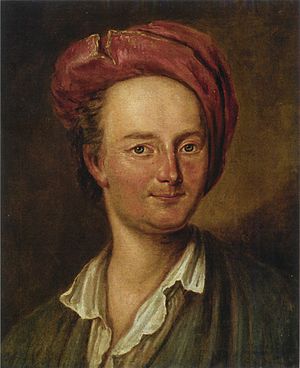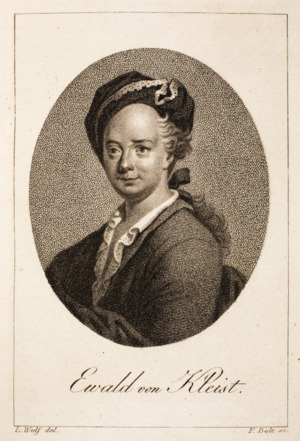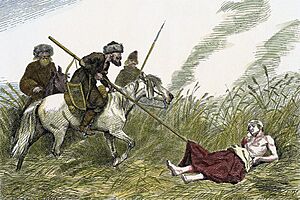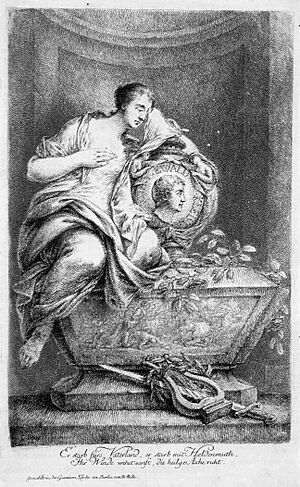Ewald Christian von Kleist facts for kids
Ewald Christian von Kleist (born March 7, 1715 – died August 24, 1759) was a German poet and a brave cavalry officer. He came from a very large and important family in Farther Pomerania, a region in what is now Poland and Germany. Many men from his family, including 58 of them, fought in the army of Frederick the Great during the Seven Years' War. Ewald Christian von Kleist was born in Zeblin, near Köslin (now Koszalin), in Farther Pomerania.
His Family and Early Life
The Kleist family was very old and well-known in Farther Pomerania, with roots going back to the 1100s. Ewald Christian's father, Joachim Ewald, was born on the family's land. In 1710, his father married Marie Juliane von Manteuffel. Sadly, she passed away in 1719 after having her sixth child.
Ewald Christian was the third child. He and his older brother, Franz Casimir, lived with their uncle, Christian von Manteuffel. They went to school in Deutsch Krone (now Wałcz, Poland) and then to the Danzig Gymnasium in 1729. In 1731, Ewald went to the University of Königsberg. There, he studied law and mathematics.
After his studies, or perhaps because his father wanted him to focus more on law, Ewald joined the Danish army. He became an officer in 1736. In 1738, he visited his family and met Wilhelmine, a distant relative. They became engaged, but his military duties kept them apart, and she later married someone else.
Military Career
In 1740, King Frederick II called Ewald Christian von Kleist back to Prussia. He was made a lieutenant in a new regiment stationed in Potsdam. There, he met J. W. L. Gleim, who helped him become interested in poetry.
Ewald showed great courage in battle. He fought bravely at the Battle of Mollwitz in 1741 and during the siege of Neisse that same year. Because of his bravery, he was promoted to captain in 1749 and then to major in 1756.
During the winter of 1757–1758, his regiment was in Leipzig during the Seven Years' War. Ewald found comfort from his military duties by spending time with the writer Gotthold Ephraim Lessing.
The Battle of Kunersdorf
Ewald Christian von Kleist was seriously wounded in the Battle of Kunersdorf on August 12, 1759. He was leading his troops at the front of the attack. He was hit many times, but he kept going forward. When his leg was badly injured, he fell from his horse.
He was carried away from the battle. Later, some Russian soldiers found him and helped him. They took him to Frankfurt, where a professor cared for him. Despite the care, Ewald Christian von Kleist died on August 24, 1759. He was given a soldier's funeral, with Russian grenadiers carrying his coffin.
His Poetry
Kleist's most famous work is a long poem called Der Frühling (The Spring), which he published in 1749. He got many ideas for this poem from Thomson's Seasons. Because of this poem, people started calling him "the Poet of the Spring."
He also wrote other types of poems, like odes, idylls, and elegies. One of his shorter epic poems was Cissides und Paches (1759). This poem was about two friends from Thessaly who died heroically for their country in a battle.
Kleist also wrote special poems called epitaphs for his friends who died in battle. One of these was for Major Heinrich von Blumenthal. It was very similar to what would happen to Kleist himself:
|
Witz, Einsicht, Wissenschaft, Geschmack, Bescheidenheit, |
Wit, sense, a mind scientific, good taste and modesty |
Kleist published his first collection of poems, Gedichte, in 1756, and a second one in 1758. After he died, his friend Karl Wilhelm Ramler published all of Kleist's works in two volumes in 1760.
The three famous Kleist poets—Ewald, Franz Alexander von Kleist, and Heinrich von Kleist—all came from the same family ancestor in the early 1400s.
See also
 In Spanish: Ewald Christian von Kleist para niños
In Spanish: Ewald Christian von Kleist para niños
 | James Van Der Zee |
 | Alma Thomas |
 | Ellis Wilson |
 | Margaret Taylor-Burroughs |





